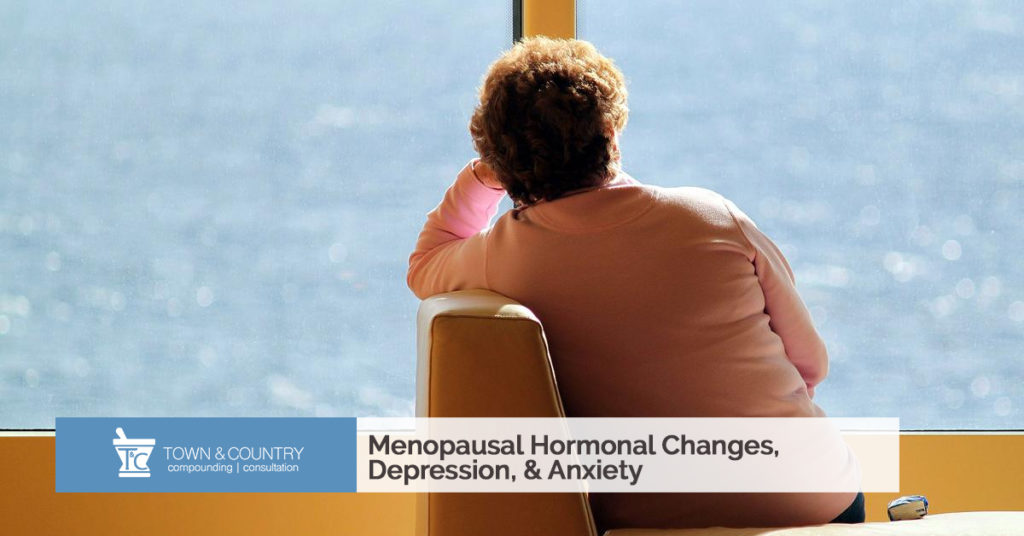Hormones, Stressors, and Other Risk Factors
Each year approximately 1.3 million women reach menopause in the United States. Although most women transition to menopause without experiencing psychiatric problems, it is estimated that 20% have depression at some point during menopause.
Observations and data suggest that depression in women begins at puberty. Hormonal changes are thought to contribute to the premenstrual dysphoric disorder (PMDD, PMS), as well as mood changes postpartum.
Hormones and Depression
Is there a connection between your hormones and depression? Studies have indicated that changes in estrogen or progesterone levels may be related to some women feeling depressed at times during perimenopause or menopause.
Estrogen
Estrogen has a close relationship with the brain and can affect the chemical messengers of the nervous system. As estrogen levels decline, regulation of serotonin and norepinephrine may change which may contribute to depression.
Many women who have experienced depression can validate that depression is often linked to times of fluctuating hormones.
Estrogen levels can affect mood and estrogen plays a role in a woman’s emotional well-being. It is important in regulating mood because it works everywhere in the body, including the area of the brain that controls emotion. Sometimes too much estrogen can symptoms (estrogen dominance) sometimes too little estrogen is the culprit. (1)
Progesterone
Progesterone is known mainly for its effect on the uterus in conventional medicine. However, progesterone receptors are located in various areas of the body beyond the uterus. Progesterone can be involved with promoting bone health, reducing hot flashes and may also be of benefit with depression and mood. There is a large concentration of progesterone receptors in the limbic area of the brain, which is the area of the brain responsible for emotions. (5)
Custom Compounded Options
If you need estrogen or progesterone replacement you have several options. Oral progesterone capsules (Rx) can be taken at bedtime when progesterone supplementation is necessary. If you require estrogen, topical estrogen is commonly prescribed, usually in the form of a cream.
Sometimes women prefer to try the estrogen and progesterone together in a cream for ease and convenience. You can try different options and then follow back up with Town & Country Compounding Experts if your symptoms are not under control and they work with your doctor to adjust either the dose or possibly change the way you take the progesterone. For Example, if you started with topical but are having problems with sleep at night, we would recommend that you take it orally at bedtime.
At Town & Country Compounding we do our best to work with the patient and the practitioner to offer other options for the patients in the Northern New Jersey & NYC areas.
Hormonal Changes and Stressors
Scientists have discovered that women with a history of mood disorders or premenstrual and postpartum mood-related symptoms are more likely to experience depression during menopause when hormones start declining.
In addition to hormonal changes, women with particular types of stressors seem to be at increased risk for perimenopausal depression. (6)
Such stressors or factors include the following (7, 8):
- Lack of social support
- Unemployment
- Surgical menopause
- Poor overall health status
- Onset of illness in self or others
- Care of aging parents
- Changes in employment
- Negative mood before menopause
- Negative attitude toward menopause and aging
- Smoking
- Little or no exercise
- No partner
- Experiencing (menopausal) symptoms
- Poor self-perceived health
- Negative feelings toward partner
- Interpersonal stress
- Empty-nest syndrome
- Societal value of youth – In societies where age is valued, fewer symptoms at the menopause transition are reported
It is never easy to experience depression or to see your loved one be depressed. We oftentimes observe an improvement in the mood after a woman’s or man’s hormones are balanced. Sometimes the depression is so severe that the patient’s loved ones seek help for the patient. It is important to note that depression is a very complicated physiological and psychological disorder and hormones may be an important piece of this puzzle.

Town & Country Compounding Hormone Experts
The compounding pharmacists at Town & Country Compounding are Certified Hormone Specialists and are trained to help you with what may be going on in your body to cause your symptoms. Even if depression and/or anxiety are your only symptoms, they can help! You may get hormone levels tested by blood tests from your physician or you can take home a hormone saliva test in that does not require a prescription.
REASONS YOU MAY WANT SALIVA TESTING
- You already had blood (serum) testing at your last doctor appointment, and your levels were normal but you still feel symptoms.
- You may not have a doctor appointment schedule anytime soon and are curious of your levels.
- You last had a test over 6 months ago and would like a repeat after adjusting lifestyle, exercise, supplements and hormones.
SALIVA TESTING IN WOMEN
Saliva is best used to evaluate the balance and flow of the estrogens and progesterone in women who are still having menstrual cycles. It can also be used to evaluate cortisol secretion patterns by taking multiple samples over the course of a day and evening. A saliva test measures free hormone and its multipoint versatility makes it a better measure than serum for evaluating unsupplemented hormone status.
Get Customized Care
Sometimes, nutritional supplements may be all you need. Many times, women are low in estrogen, progesterone, testosterone or all of them and require replacement.
As Bio-identical hormone replacement therapy experts, Town & Country Compounding works closely with many doctors who specialize in hormones and can be empathetic to your situation.
At Town & Country Compounding we do our best to work with the patient and the practitioner to offer other options for hormone imbalance patients
References
- Todd, Nivin. “Estrogen and Women’s Emotions.” WebMD, WebMD, 23 July 2019, https://www.webmd.com/women/guide/estrogen-and-womens-emotions.
- Bronson, P. J. (2001). Mood biochemistry of women at mid-life. Journal of Orthomolecular Medicine, 16(3), 141-154. Retrieved from http://www. orthomolecular.org/library/jom/2001/pdf/2001-v16n03-p141.pdf
- Bronson, P. J. (2001, February, & 2012, February). Personal interviews.
- Graham, J. D., & Clarke, C. L. (1997). Physiological action of progesterone in target tissues. Endocrine Reviews, 18(4), 502-519. doi:10.1210/edrv.18.4.0308
- Seifert-Klauss, V., & Prior, J. C. (2010). Progesterone and bone: Actions promoting bone health in women. Journal of Osteoporosis, 2010. doi:10.4061/2010/845180\
- Hitchcock, C. L., & Prior, J. C. (2012). Oral micronized progesterone for vasomotor symptoms – A placebo-controlled randomized trial in healthy postmenopausal women. Menopause, 19(8), 886-893. doi:10.1097/ gme.0b013e318247f07a
- Eichling, P. S., & Sahni, J. (2005). Menopause related sleep disorders. Journal of Clinical Sleep Medicine, 1(3), 291-300. Retrieved from http://www. aasmnet.org/JCSM/Articles/010312.pdf
- Brinton, R. D., Thompson, R. F., Foy, M. R., Baudry, M., Wang, J., Finch, C. E., . . . Nilsen, J. (2008). Progesterone receptors: Form and function in brain. Frontiers in Neuroendocrinology, 29(2), 313-339. doi:10.1016/j. yfrne.2008.02.001 2


